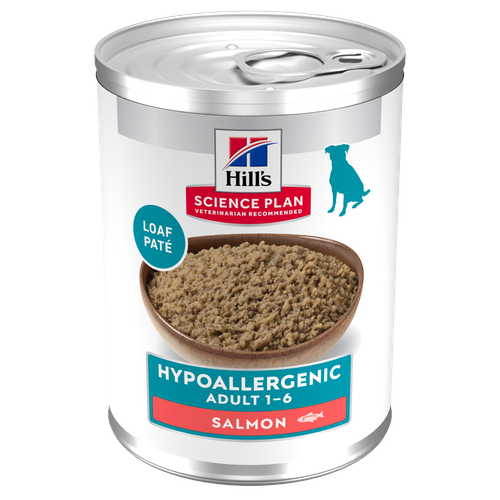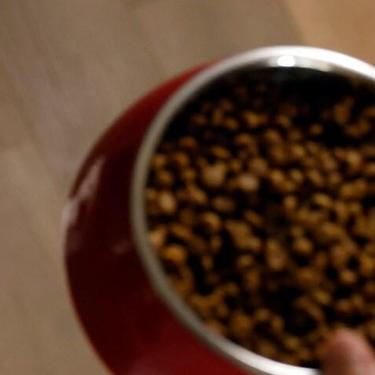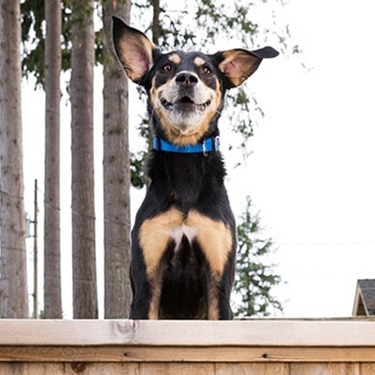
-
Vind de juiste voeding voor uw huisdierDoe de quiz en ontdek welke voeding het beste bij uw viervoeter past.Vind de juiste voeding voor uw huisdierDoe de quiz en ontdek welke voeding het beste bij uw viervoeter past.Gezondheids categorieAanbevolen producten
 Hypoallergenic Adult Natvoer
Hypoallergenic Adult NatvoerHill's Science Plan Hypoallergenic Adult Natvoer Hond met Zalm is een compleet premium dierenvoer voor alle volwassen honden vanaf 1 jaar. Deze smaakvolle paté uit blik is speciaal samengesteld voor honden met een gevoelige huid en maag. Het bevat één nieuwe dierlijke eiwitbron en is graanvrij.
Shop Now Sensitive Stomach & Skin Small & Mini Adult hondenvoer met Kalkoen
Sensitive Stomach & Skin Small & Mini Adult hondenvoer met KalkoenHill's Science Plan Sensitive Stomach and Skin Small & Mini Adult Natvoer Hond met Kalkoen is een compleet premium dierenvoer voor volwassen honden van een klein ras van 1 tot 6 jaar oud. Deze heerlijke zachte mousse is verrijkt met ingrediënten die de spijsvertering en de verzorging van de huid ondersteunen.
Shop Now Sensitive Stomach & Skin hondenvoer met Kip
Sensitive Stomach & Skin hondenvoer met KipHill's Science Plan Sensitive Stomach & Skin Adult Natvoer Hond met Kip is een compleet premium hondenvoer voor volwassen honden vanaf 1 jaar. Deze smaakvlolle paté uit blik is verrijkt met ingrediënten die de spijsvertering en de verzorging van de huid ondersteunen.
Shop NowGezondheids categorieAanbevolen producten Senior Vitality Mature Adult Natvoer Kat Kip & met Zalm
Senior Vitality Mature Adult Natvoer Kat Kip & met ZalmMalse brokjes met kip in saus voor oudere katten, ter ondersteuning van de veroudering, vitaliteit en hersenfunctie. Met licht verteerbare ingrediënten van hoge kwaliteit en vitamine E en omega 6-vetzuren voor een glanzende vacht.
Shop Now Mature Adult Natvoer Kat met Zeevis
Mature Adult Natvoer Kat met ZeevisMalse brokjes in saus voor oudere katten. Met licht verteerbare ingrediënten, eiwitten van hoge kwaliteit om spiermassa te behouden en antioxidanten vitamine C + E voor een optimale gezondheid.
Shop Now Healthy Cuisine Sterilised Cat Adult Stoofpotje voor Katten met Kip & toegevoegde Groenten, met Zalm & toegevoegde Groenten
Healthy Cuisine Sterilised Cat Adult Stoofpotje voor Katten met Kip & toegevoegde Groenten, met Zalm & toegevoegde GroentenHill's Science Plan Healthy Cuisine Stoofpotjes zijn 100% gebalanceerd en gezond, samengesteld met een onweerstaanbare smaak waar katten dol op zijn.
Shop Now -
Hond
- Hondentips & artikelen
-
Hond gezondheids categorie
- Gewicht
- Voedsel- & milieugevoeligheden
- Urinewegen
- Spijsvertering
- Gewrichten
- Nieren
- Herstellende zorg
- Mondverzorging
-
Hond levensstadium
- Puppyvoeding
- Volwassen voeding
- Senior voeding
Kat- Kattentips & artikelen
-
Kat gezondheids categorie
- Gewicht
- Huid- & voedselgevoeligheden
- Urinewegen
- Spijsvertering
- Nieren
- Haarbal & perfecte vacht
- Herstellende zorg
- Mondverzorging
- Stress
-
Kat levensstadium
- Kittenvoeding
- Volwassen voeding
- Senior voeding
Uitgelichte artikelen Urinekristallen en -stenen bij honden en katten
Urinekristallen en -stenen bij honden en kattenLees over de oorzaken en behandelingen van urinekristallen bij honden en katten, om je huisdier gezond te houden. Bezoek Hill's voor deskundig advies over verzorging van de urinewegen.
Read More Virtual Vet Visits: What You Need to Know
Virtual Vet Visits: What You Need to KnowLearn the ins and outs of a televet appointment before you talk to a vet online.
Read More Realistische goede voornemens voor jou en je huisdier | Hill's Pet
Realistische goede voornemens voor jou en je huisdier | Hill's PetAan het einde van het jaar maken veel mensen goede voornemens voor het nieuwe jaar: ze willen bepaalde gewoonten aanleren (of afleren) om het jaar gezond en gelukkig te beginnen.
Read More -

 Wetenschappelijk onderbouwde voeding creëert verschillen die u kunt vertrouwen.
Wetenschappelijk onderbouwde voeding creëert verschillen die u kunt vertrouwen.


It's not unusual for dogs to throw up. In fact, there are many reasons why your dog might vomit, and some are more concerning than others. So how can you tell if the dog vomit on the grass is a sign of serious trouble? Are there different types of vomit? Read on to find out more.
Vomiting vs. Regurgitation
What causes a dog to vomit? First, you should understand the difference between vomiting and regurgitation. When a dog regurgitates, the coughed-up material typically consists of undigested food, water and saliva. It is often expelled in a cylindrical shape, since regurgitated material is usually the food or matter in the oesophagus. It comes out seemingly effortlessly, without muscle contraction. It's unlikely there will be any warning — either for you or your dog — that anything is coming up.
Vomiting, conversely, is much more active. It will cause muscles to contract and the whole body to tense. When a dog vomits, the food or object is typically coming from the stomach or upper small intestine. You will likely hear the dog retching and see food that is undigested or partially digested, along with clear liquid if it's from the stomach, or yellow or green liquid (bile) if it is from the small intestine. You might also have a little more warning that vomit is coming, such as drooling, pacing, whining or loud gurgling noises from your dog's stomach.

Common Causes of Vomiting
The UK Kennel Club says that common causes of vomiting in dogs include:
- Eating rubbish, table scraps, or other things they shouldn’t eat.
- Swallowing something hard like a stone, bone or toy, or something poisonous, like cleaning products, antifreeze, or pesticides.
- Viruses, bacterial infections, or parasites.
- Changes to their diet, like a new dog food.
- Sensitivity to certain foods or ingredients.
- Bloating or other gastrointestinal problems.
- A bad reaction to a medication they’ve been given.
- Heatstroke.
- Health conditions that affect the gut, kidkeys, liver or pancreas.
The most common reasons for regurgitation are:
- Gastric reflux and oesophagitis.
- An obstruction or stricture in the oesophagus.
- Congenital oesophageal disease (megaesophagus), which is more common in breeds including the shar-pei, German shepherd, Great Dane, Irish setter, Labrador retriever, miniature schnauzer, Newfoundland and wire fox terrier.


Smakelijke tips
Puppy's hebben in hun eerste jaar mogelijk meerdere vaccinatiebezoeken nodig. Volwassen honden hebben doorgaans baat bij een jaarlijkse controle, terwijl oudere honden of honden met speciale behoeften mogelijk vaker op controle moeten.
When to Be Concerned
Because vomiting is not that unusual in dogs, pet parents are typically not concerned if a dog throws up occasionally. But when should you worry?
The Kennel Club notes that there are a few dog vomit scenarios that should be cause for concern:
- You think your dog has swallowed a foreign object or something poisonous.
- Your dog has not only thrown up, but is also acting differently from usual — such as sleeping more than usual, refusing to eat, or having diarrhoea — you should call your veterinarian.
- Your dog has a fever, appears dehydrated, or seems to be in pain.
- If you see blood in the vomit or poo, or if your dog is throwing up something that looks like coffee grounds — digested blood — call the vet. The blood can be a sign of serious problems, such as gastric ulcers, or a sign that your dog has eaten a sharp foreign object, such as a bone or toy.
- Your dog won't stop vomiting. While occasionally throwing up isn't unusual, if your dog throws up routinely or excessively, consult a vet to find out why. It may also be cause for concern if your dog appears to be trying to vomit but can’t.
If you're concerned at all about your dog’s health, don't hesitate to call your vet for advice.
What Your Vet Will Do
When your veterinarian evaluates your dog, they will likely first want a good history of anything your dog may have eaten or gotten into and information on how often they are vomiting or regurgitating. They may want to do bloodwork to look for causes of vomiting such as kidney disease or pancreatitis. They may also need to do X-rays and/or an ultrasound if they think your dog may have an obstruction in the GI tract or the oesophagus is not working properly.
Once your vet is able to identify the problem, they can start treatment to get your dog feeling better quickly.
What You Can Do
If your vet determines what causes your dog to vomit and says that at-home care is sufficient for your dog, you'll want to know how to alleviate their symptoms. The PDSA has these care tips for your vomiting dog:
- Withhold food for 6-8 hrs unless a longer period is recommended by your veterinarian.
- Make sure your dog is still drinking water unless your vet has advised otherwise. With persistent vomiting, dehydration can be a real cause for concern, which is why fluids are so important.
- Once vomiting stops, offer your dog small, bland, low-fat meals three to six times daily for a few days. If your vet asked you to withhold water, re-introduce it slowly in small amounts.
- Gradually increase the amount of food and decrease the feedings as you transition back to your dog's normal food.
If you determine your dog is throwing up because he is eating too fast, one solution might be a "puzzle feeder," which forces dogs to eat slower as they work to obtain food. You can also try switching your dog's food to a higher-quality food or a special dietetic food, which offers your dog easy digestion and balanced nutrition. Switch to their new food slowly, rather than all at once, or you might exacerbate the problem.
A dog who throws up is not necessarily ill or in need of immediate veterinary attention. But if you see signs that make you believe something might seriously be wrong, call your vet to determine what the problem is and how to solve it. You'll soon be back to petting your pup rather than cleaning up his puke.


Kara Murphy is een freelance schrijfster en huisdiereigenaar die in Erie, Pennsylvania woont. Ze heeft een goldendoodle genaamd Maddie.
Gerelateerde producten

Hill's Science Plan Hypoallergenic Adult Natvoer Hond met Zalm is een compleet premium dierenvoer voor alle volwassen honden vanaf 1 jaar. Deze smaakvolle paté uit blik is speciaal samengesteld voor honden met een gevoelige huid en maag. Het bevat één nieuwe dierlijke eiwitbron en is graanvrij.

Hill's Science Plan Sensitive Stomach & Skin Adult Natvoer Hond met Kip is een compleet premium hondenvoer voor volwassen honden vanaf 1 jaar. Deze smaakvlolle paté uit blik is verrijkt met ingrediënten die de spijsvertering en de verzorging van de huid ondersteunen.

Hill's Science Plan Small & Mini Mature Adult Hondenvoer met Kip is een compleet dierenvoer, speciaal samengesteld met ActivBiome+ Multi-Benefit technologie.
Gerichte voeding om kleine honden te helpen mooi oud te worden. Speciaal samengesteld met een synergetische mix van voedingsstoffen voor meer energie en levenslust.

Hill's Science Plan Sensitive Stomach and Skin Small & Mini Adult Natvoer Hond met Kalkoen is een compleet premium dierenvoer voor volwassen honden van een klein ras van 1 tot 6 jaar oud. Deze heerlijke zachte mousse is verrijkt met ingrediënten die de spijsvertering en de verzorging van de huid ondersteunen.
Gerelateerde artikelen

Vind de beste voeding voor kleine hondenrassen en maak de beste keuze voor de gezondheid van jouw hond. Ontdek meer advies over kleine honden bij Hill's.

Informatie over wat je je drachtige of zogende hond kan voeren om haar en haar nieuwe puppy's gezond te houden.

Informatie over de voedingsbehoeften van je oudere kleine hond, voor een lang en gezond leven. Vind de juiste voeding met deskundig advies van Hill's.

Ontdek de voordelen van natvoer en hoe het het welzijn en de levenskwaliteit van je hond kan verbeteren. Bezoek Hill's voor meer informatie over voeding.

Zet uw hond op dieet zonder dat hij het weet
Onze caloriearme formule helpt je het gewicht van je hond onder controle te houden. Het zit boordevol hoogwaardige eiwitten voor de opbouw van soepele spieren en is gemaakt met doelgerichte ingrediënten voor een smakelijke, voedzame maaltijd. Klinisch bewezen antioxidanten, vitamine C+E, dragen bij aan een gezond immuunsysteem.
Zet uw hond op dieet zonder dat hij het weet
Onze caloriearme formule helpt je het gewicht van je hond onder controle te houden. Het zit boordevol hoogwaardige eiwitten voor de opbouw van soepele spieren en is gemaakt met doelgerichte ingrediënten voor een smakelijke, voedzame maaltijd. Klinisch bewezen antioxidanten, vitamine C+E, dragen bij aan een gezond immuunsysteem.